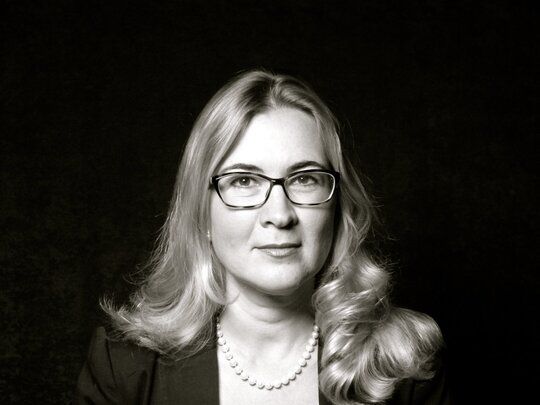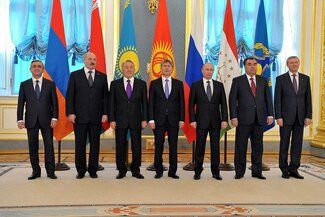The electoral campaign in France is already dominated by the Russian invasion of Ukraine. The war that Vladimir Putin is waging against a neighboring country represents a major strategic break in Europe, and its repercussions stretch far beyond the continent. The initial military project of a blitz with a limited number of civilian casualties has proved a failure. Putin’s miscalculations of the Ukrainian resistance, the reaction of Westerners, and the extent of his own population’s support are obvious. However, the Russian president has chosen to forge ahead, at the risk of a flare-up beyond Ukraine and the possible downfall of his own regime. What can and should France do in the face of such enormous challenges?
Persisting with the Diplomatic Approach
First of all, communication channels with the Russian president must be maintained. Emmanuel Macron has stepped up his diplomatic efforts in recent months, weeks, and days. Renouncing this role would amount to marginalizing the European Union (EU) from the outset and leaving the Americans to maneuver alone in a conflict that directly concerns Europe. Parisian diplomacy has its limits, and this dialogue has not produced the desired results: it has failed to prevent the outbreak of hostilities and has not led to any sign of Putin changing his approach. Nevertheless, it makes it possible to sound out his intentions, if only partially. With what we know or assume of the isolation of the Russian president and the incomplete or biased information with which his entourage is supplying him (in particular, to exonerate themselves), we must not underestimate the importance of him speaking directly with a Western leader, who can present him with a completely different truth. In the short term, the main goal of this diplomatic approach is to stop the military escalation and prevent new irreparable acts.
Other Immediate Actions
Beyond the attempts to pierce the bubble in which Putin has isolated himself, France is supporting assurance measures for NATO allies in Eastern Europe, such as Poland, Romania, and the Baltic states. Support for Ukrainian refugees not only in France but also in Poland, Moldova, and other countries bordering Ukraine requires concerted action at the EU level. French companies established in Russia will have to accept some damages; although, at the time of writing (early March 2022), none are planning to leave the country, the situation may change rapidly in the event of new Western sanctions or Russian counter-sanctions. It is also necessary to raise awareness among the French people, who will also suffer consequences, on the economic and energy levels at the very least. Resilience plans must be developed to manage Russian counter-sanctions, particularly in the energy sector. All of these measures must be accompanied by a well-calibrated communication campaign.
Preparing for Every Eventuality
No direct Western military intervention is under consideration at this stage. Ukraine is not a member of NATO, and the West has repeatedly said that it will not send troops to support Ukraine. For now, the Atlantic Alliance is refusing to act on President Zelenskyy’s request to create a no-fly zone over Ukraine. The same posture of military restraint would likely be maintained in the event of Russian aggression against Moldova or Georgia, which, like Ukraine, are not members of NATO and contain “frozen conflicts” in their territories, with the presence of Russian troops in enclaves under Russian control. Western nuclear powers are wary of responding to Putin’s strategy of nuclear intimidation. Several Western countries are now supplying military equipment to Kyiv, which Moscow may end up considering as an act of war (especially in the case of aircraft deliveries), as well as imposing sanctions, which are seen as devastating. A potential incident at the Polish border by which weapons arrive in Ukraine, or an incursion into the Baltic states, which are members of NATO, are not to be excluded. This would give rise to a terrible dilemma: to enter a war on a completely different scale against the Kremlin, with unpredictable consequences; or to abandon these countries to a fate they have been trying to escape since the fall of the USSR. Defenses need to be strengthened in the cyber, information, and space sectors. Finally, it is necessary to anticipate the consequences of the war in Ukraine in other regional theaters, from Syria to Africa.
The Aftermath
The end of the war is nowhere in sight, and President Macron has warned that “the worst is yet to come.” Nevertheless, we must already begin to anticipate the new balances that will result from this historic rupture. Immediate decisions must be placed in a long-term perspective from the outset. The time will come to redefine the relationship with Russia, distinguishing Putin and his entourage from the Russian people, who have themselves been taken hostage, to help refugees return, to rebuild Ukraine… A new European security architecture must emerge from this tragic ordeal, encompassing the countries of the Eastern Partnership and perhaps even those of the Eurasian Economic Union. Giving substance and meaning to the EU’s current drive toward greater strategic autonomy and translating awareness of European collective strengths and weaknesses into proactive and sustainable policies: these are the dizzying challenges facing European countries if they are to create lasting peace on the continent and establish safeguards against the tragic repetitions of history.


